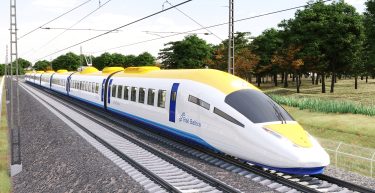The survey revealed that there continues to be a consistently high level of support for the region’s largest railway infrastructure project, with an average support rate of 66%. This figure remains consistent with the 61% support recorded a year prior and the 62% support registered in 2021. The findings underscore a notable level of awareness across the Baltic states, with a substantial majority, over 90% of respondents in Estonia, Latvia, and Lithuania, demonstrating knowledge about Rail Baltica.
In Estonia and Latvia, awareness levels are notably high among respondents aged 18-24 and 66-75, while in Lithuania, the highest awareness is demonstrated by individuals aged 56 and older. In Latvia, awareness is higher in urban hubs like Rīga and Pierīga, whereas across Lithuania, awareness levels remain relatively consistent between the capital and other urban centers, with a slightly lower yet not statistically significant level observed in rural areas. In Estonia, awareness levels trend slightly higher in rural areas than in major cities.
“We observe broad awareness of Rail Baltica across various age demographics, from the youngest respondents – representing the future users of Rail Baltica, likely eager to seize the opportunity to travel in a modern and sustainable way – to the eldest group, who grasp the extensive economic impact that Rail Baltica brings to their respective countries and the region. Nevertheless, this survey also helps to identify areas that should be addressed to provide more transparency among the different target audiences,” said Signe Nīgale, Head of the Communication and International Relations Department at RB Rail AS.
A long-term investment that is strengthening Baltic relations
The survey identified several aspects of the Rail Baltica project deemed particularly important by Baltic inhabitants. These include the contribution to economic growth at both national and regional levels, the enhancement of transportation links within the Baltic states and with other European countries, and the promotion of environmentally friendly public transportation. The importance of these aspects varied slightly among respondents in each country, reflecting different priorities and perspectives.
Despite variations in the importance placed on different aspects, overall support for the Rail Baltica project remained steadfast across the Baltic states. Respondents agreed that Rail Baltica will provide more transportation links with other European countries, facilitate faster travel between Baltic countries, and create new long-term job opportunities. Furthermore, most respondents recognised Rail Baltica as a long-term investment worth pursuing, highlighting its potential to strengthen inter-Baltic relations and foster economic growth.
The survey findings indicate steady support for the Rail Baltica project since 2018, with an average of 69% of respondents from the three countries describing their attitude toward the project as positive.
*The annual quantitative online survey among the residents of the Baltic States was commissioned by the Rail Baltica joint venture RB Rail AS and conducted by the marketing research company ‘Norstat.’ The data collection was implemented using CAWI – Computer Assisted Web Interviews, targeting individuals aged 18-75. The survey gathered responses from over 3000 participants in total (1001 respondents in Latvia, 1003 respondents in Lithuania, and 1002 respondents in Estonia).”



